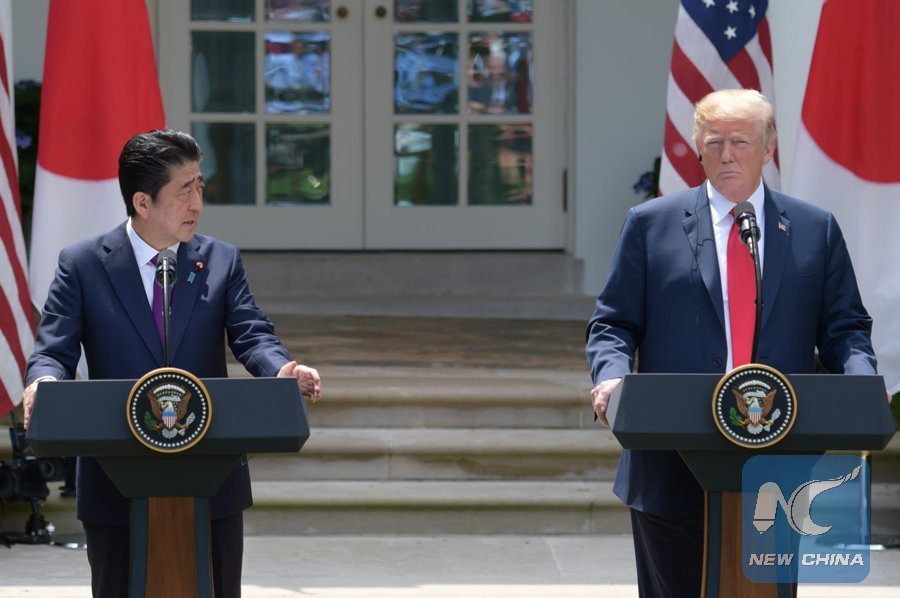
U.S. President Donald Trump (R) and Japanese Prime Minister Shinzo Abe attend a joint press briefing at the White House in Washington D.C., the United States, on June 7, 2018. (Xinhua/Yang Chenglin)
WASHINGTON, June 7 (Xinhua) -- Visiting Japanese Prime Minister Shinzo Abe on Thursday struck a positive tone towards the upcoming meeting between U.S. President Donald Trump and Kim Jong Un, the top leader of the Democratic People's Republic of Korea (DPRK) in Singapore.
However, his whirlwind trip to White House failed to get the two nations to meet each other halfway on issues such as Korean Peninsula denuclearization, the abduction of Japanese citizens and the trade wrangle between them.
ON DENUCLEARIZATION
At a joint press briefing with Trump in the White House, Abe said he "strongly" hopes that the "historic" Trump-Kim meeting could be "a resounding success" and "Japan stands ready to make every effort" for the success.
His remarks echoed Trump's positive statement that he is willing to invite Kim to visit the United States for further talks if their meeting in Singapore goes well.
Trump said he and Kim "could absolutely sign an agreement," but the Singapore meeting is the easy part while the hard part for the settlement of all the issues is after that.
However, Trump's statement did not dispel Tokyo's fundamental doubts.
In addition, Trump did not invite Japan to attend the summit despite Wednesday's reports that Japan is considering sending senior officials to Singapore.
Daniel Sneider, a lecturer on East Asian studies at Stanford University, said in an article published on Tokyo Business Today that Trump has publicly backed away from the goal of an agreement on a rapid path to complete, verifiable and irreversible disarmament.
Richard Samuels, director of the Center for International Studies at the Massachusetts Institute of Technology, said: "He (Trump) has given every reason for Tokyo to fear that Washington will compromise their security by cutting a deal that doesn't include short range missiles and that effectively acknowledges the DPRK as a nuclear weapons state. Abe has few cards to play to forestall that."
ON ABDUCTION ISSUE
Abe said Trump will put to Kim the abduction issue, which involves several Japanese citizens, adding that he is mulling a meeting with Kim after the Singapore gathering.
"If we are to have the summit meeting, the nuclear, the missile, and what is more important, the abduction issue -- the solution to all these issues must be resolved," he said.
Though Trump said he will "absolutely" talk with Kim about the abduction issue in Singapore, he did not give commitment to the final results.
Raising the issue to Kim "costs Trump nothing," Ferial Saeed, former senior advisor on Iran and North Korea policy at the State Department, was quoted by Sneider as saying.
Saeed said that Trump can use it to pressure Abe to provide economic aid to Pyongyang, and "Abe can go back to Tokyo and claim that he got the issue on the agenda."
Jenna Gibson, communications director at the Washington-based non-profit Korea Economic Institute, told Xinhua that the United States agrees that the DPRK should address the issue, but "doesn't see it as a top priority in the same way that Abe does."
Analysts said that the idea that Abe can shape Trump's policy towards the DPRK, a precious belief in Abe's office, "is largely an illusion."
ON TRADE ISSUE
Speaking of the bilateral trade imbalance, Trump said that it was an issue the two nations "have to" deal with.
He said that Abe had promised him Japan would buy "billions and billions of dollars of additional products of all kinds," which included military jets from Boeing and lots of farm products.
Japan also vowed to build more factories in the United States, the White House host said.
Abe's offer could not satisfy Trump, and the Japanese population back home, however.
Abe has reportedly made clear that he opposes Washington's levying of steel and aluminum tariffs for alleged national security reasons on a trade ally. If necessary, he said, Japan will seek resolution through the World Trade Organization (WTO).
Japan has notified the WTO that it may impose 264 million U.S. dollars in tariffs on U.S. goods in retaliation, Bloomberg reported.
Tokyo has joined the Western chorus against the U.S. challenge to the world trading system and this will likely occupy the Group of Seven summit later in Canada.
"Japan should take a leading role in preserving the WTO framework. And so we will act when we feel we should act," Abe said before departing to Washington.
Trump has demonstrated a view of Japan deeply rooted in the trade wars of the 1980s, shaped by his experience in the New York real estate market when Japanese were "grabbing up" premier properties, said Sneider.
He quoted a Congressional source as saying that "for Trump, Japan was always a foe."
"The domestic constraints create opposing incentives for both leaders," said Mireya Solis, the head of Japan studies at the Brookings Institution.
"Ahead of the midterm election, Trump wants huge 'wins' in foreign policy" such as a breakthrough on the DPRK and jolting trading relationships while "the opposite is true for Abe" who wants to achieve meaningful outcomes also on the DPRK and protect an open trading system, Solis said.
"Abe may have to rethink his strategy and figure out how to translate his good personal ties with Trump into policy wins for Japan," Gibson told Xinhua.

